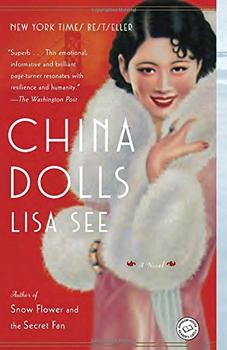Summary | Excerpt | Reading Guide | Reviews | Beyond the Book | Readalikes | Genres & Themes | Author Bio

In the entry hall, workers— dressed in baggy pants, sleeveless undershirts, and painters' caps— carried lumber and other construction materials. A Chinese woman, sitting at a table made from two- byfours and a sheet of plywood, handed us forms with spaces for our names, heights, weights, and ages. I wrote down the address of my family's compound. I glanced over Grace's shoulder as she scribbled the name of a hotel in a seedy part of town.
The woman, who I was sure recognized me, took Grace's form and scanned it. "You're seventeen?" she asked, not bothering to look up.
"Is that all right?"
"We've got younger inside. We just don't want you to be too young." She pointed down the hall. "You can change in that room on the right. After that, sit with the other girls trying out today. They'll call you when they're ready." She didn't specify who "they" were. I lingered by the table when Grace walked down the hall.
"If I get the job, how much will you pay?" I inquired.
"Twenty a week," the receptionist answered. I could almost hear additional words pouring out of her mouth. As though you need it. Then she bent back to her paperwork.
I could have walked out right then, but I was intrigued. Maybe I could do this. I traced the path Grace had taken and entered the halffinished ladies' room. She had changed into a soft pink one- piece playsuit with short puffed sleeves and little shorts.
"I made this," she boasted, "after I saw Eleanor Powell wear something like it in Born to Dance. I couldn't tell the color of the playsuit in the film, but I thought this fabric would look pretty against my skin."
I hadn't been to many movies, so I didn't know what to say. She glanced in the mirror, squished her curls a couple of times to perk them up, and covered a cut with lipstick. I'd never be so rude as to ask her what had happened, but then she turned in my direction, frowned, and asked me a totally inappropriate question.
"You don't know how to doll up, do you?" she said with a laugh.
She poked around in her bag and fished out a slippery thin pink hair ribbon, which she tucked between her lips. She turned me toward the mirror, ran her fingers through my hair, and then whisked the ribbon from her lips, passed it behind my neck, and pulled the satin strips to the top of my head, where she tied a bow. "That's better!" And it was, because the pink lifted my cheeks' natural color.
We exited the restroom and followed the sound of music and rhythmic tapping. At the end of the hallway, I saw construction framing— for what looked like a bar to the left and a large central room. The stage looked done, though. The place was still a skeleton, but as my mind put flesh on it I began to see a nightclub like the one in Shanghai where I'd once danced the fox- trot . . .
Onstage, as if testing it for the first time, a Chinese man, twentysix or twenty- seven, or maybe older, wearing cream- colored pants and a blue button- down linen shirt, slid across the floor, spun, and then resumed tapping. His arms appeared simultaneously loose and taut. The slap of his shoes as they hit the parquet— tat-a-tat — reverberated through the floorboards and shivered up my spine. His hair was slicked back with pomade, but his athletic steps— rattling now foot over foot across the front of the stage— caused strands to break loose and flop across his forehead. This, in turn, made him flip his head back after every dance phrase to clear his vision. And he was tall— almost six feet— which was extraordinary for a Chinese. He had no musical accompaniment, but his feet tapped out a rhythm that continued to build. Rah- cha, rah- cha, tat, tat, tat. Spin. Slide. Now his arms and legs flew— like a windmill. A group of forty or so girls, who sat cross- legged on the floor before the stage, clapped and cheered. Next to me, Grace radiated delight. I couldn't help feeling the same way, because this was a lot better than the Chinese Telephone Exchange.
Excerpted from China Dolls by Lisa See. Copyright © 2014 by Lisa See. Excerpted by permission of Random House. All rights reserved. No part of this excerpt may be reproduced or reprinted without permission in writing from the publisher.
Courage - a perfect sensibility of the measure of danger, and a mental willingness to endure it.
Click Here to find out who said this, as well as discovering other famous literary quotes!
Your guide toexceptional books
BookBrowse seeks out and recommends the best in contemporary fiction and nonfiction—books that not only engage and entertain but also deepen our understanding of ourselves and the world around us.